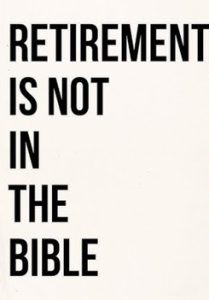
The dictionary definition of retirement is “to withdraw from service, to have no more use or meaning.” When a company retires a machine from service, it no longer needs the machine, or the machine has no value to offer. The Navy mothballs ships as a way of retirement. Car manufacturers retire car models because they are no longer popular or have become outdated.
I am at the point in my life where many of my friends, colleagues, former teammates and classmates are considering retirement. In fact, I am the only one still working out of my close high school buddies. However, I am not ready to be done making a difference and sharing my value. I am ready to be done with spending hours on planes and nights in hotels, hitting assigned sales targets, implementing the latest transactional selling methodology, and attending the weekly pipeline meetings all about the numbers.
Retirement, or the practice of ceasing to work after reaching a certain age, has been around since the 18th century. In 1905 Canadian physician William Osler expressed his conviction that a man’s best work was done before he was forty years old, and by age sixty, he should retire. He noted workers between ages forty and sixty were tolerable but “uncreative”. After age sixty, he said the average worker was “useless.”
By 1935, the idea of paying older people a pension sufficient to get them to quit working became widespread. FDR implemented the Social Security Act of 1935, which made workers, and their employers fund their retirement at age 65. The idea of our modern retirement came into being in the US during the 1950’s and was an American idea at the time. The US had become wealthier, with greater access to better food and medical care. Family dynamics had changed where older generations lived longer and younger generations started living on their own. As a result, people were able to have a more active and pleasure focused period of retirement than prior generations.
Retirement has its issues. Going from structure to total flexibility is often a shock. Americans struggle with the ability to appreciate doing nothing. When there is no purpose for the wealth and wisdom accumulated during the decades of a career, issues like boredom and depression can arise and lead to destructive behaviors and addictions. Retirement can sadly look like “just existing” where someone is merely looking for things to fill time and there’s no real sense of daily accomplishment.
I don’t plan on retiring but instead will repurpose. Repurposing is when we don’t just retire from something, but retire to a life of greater purpose, impact and meaning. It is moving towards the next thing, not away from the last thing. Same direction, completely different energy. Repurposing is the beginning of an open highway. We have the time, resources, and wisdom to pursue a new purpose in life. We have skills that can be employed to make a difference as opposed to making a living.
A repurposed person looks for ways to grow, improve, and be engaged. They actively seek opportunities to connect, serve, and contribute within their community. They are intentional about living with purpose. They spend their time nurturing relationships, teaching others, and growing spiritually.
The Roman statesman and philosopher Cicero, believed “old age” should be dedicated to service, it should be sharing our wisdom to enrich others through mentoring, advising, and teaching. One of my favorite blogs from years ago, Final 1/3, is a deeper reflection on this time of life. Instead of focusing on the scope of our achievements, it should be about the depth of our impact. Our legacy is not how many footprints we leave. It’s how long they last. Our scorecard need not be the financial deposits into our 401k accounts, but the emotional deposits in the lives of others.
Retirement is not a Biblical concept, but a cultural concept. Nowhere in the Bible does it mention we should stop working. This doesn’t mean we need to labor until we die, but the type of work we will do later in life is different. This phase in life is where we can use our gifts, skills and abilities to glorify God differently than when we worked full-time. Good works, loving our neighbor, and giving testimony have no age constraint. If the Lord is still giving us breath, it is because He still has work for us to do. Consider St. Paul, who as evidence supports in his later years, around 60, conducted a fourth missionary trip to Spain.
Scripture is full of those late in their lives, serving in an effective way. Perhaps the most beautiful example is Jacob in Genesis. As Jacob approached the end of his life, he blesses Pharoah twice, then Joseph’s sons, and finally he blesses his own twelve sons with deep spiritual insight and power. In his final days, his usefulness is acts of blessing to others. We also have Caleb, at 85 years old, entering the promised land with the courage and strength to fight and settle the land.
Are we redeeming our retirement for God’s glory, or are we spending it on ourselves and our enjoyment? Are we looking more forward to retirement or heaven? My plan does not revolve around improving my golf game, collecting seashells, or hanging out at the pool. To me, retirement isn’t the last chapter; it is the next to last chapter in my journey.
We must look at retirement differently and repurpose our talents, experiences and skills. Every part of life is to be useful and fruitful. Finishing life in a way that glorifies Him, is a life well finished.




